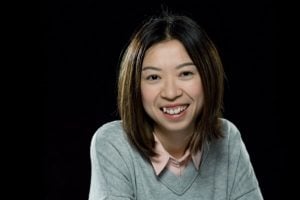
Photographs courtesy of Mind The Gap
Mind the Gap, the UK’s largest learning disability theatre company is taking its production of Mia, a story of the difficulties associated with disability and parenthood, to the Edinburgh Fringe. As the only learning disability theatre company at this year’s events, we caught up with Resident Director, Joyce Nga Yu Lee, on the eve of her Fringe debut to find out what inspired her to create Mia and why she hopes the Daughters of Fortune project will raise the profile for disability and the arts.
TSOTA: You have been based in Leeds for some years now, what is it about the North that you love?
J: My favourite thing about the North is the people, especially the Yorkshire folks. I was lucky enough to come across a lot of friendly people when I first arrived who made me feel welcome and part of a community. I once remember telling someone that I was from Hong Kong and they replied with “wat ya doin’ ‘ere then?”…can’t beat that accent. From chips with gravy, Betty’s tea rooms, to the moors and the dales, I love Yorkshire.
TSOTA: What was your main motivation behind Mia?
J: Theatre is what I do best and I believe it has the capability to touch hearts and minds and sometimes, when done well, even change them. Mia explores stories about learning disability and parenthood. Stories of learning disabled people’s parenthood are not told enough, and yet there are a lot of myths and preconceptions. I want to share these truthful and hidden stories by using engaging theatrical techniques. Ultimately Mia is about humanity, and it urges audience to think about the kind of world we want to live in.
TSOTA: Why did you deem it important to tackle the issues of disability and parenthood straight on?
J: When I make theatre I always remind myself that my job is to ask questions not to give answers. In Mia I want people to start to consider this issue and make their own judgement. I do not want to advocate any one single point of view. We are all different people and the success of humanity depends on mutual understanding and cooperation. I wanted to tackle the issue head on because we have been hiding away from it for too long, too many misunderstandings and assumptions have been made. It is time we examine the subject with a no nonsense approach and, hopefully, come to a mutual understanding.
TSOTA: What originally sparked your interest in theatre and what has been your best production?
J: When I was 15 my BFF was in a drama club and she needed someone to help in the costume and make-up department. My best production so far has to be Mia. I’ve done some exciting large-scale outdoor spectacles that were really high up on my list, but Mia has got an edge. If Mia was a cake it would be something from a French patisserie. Detailed, petite, delicate but packed full of bold flavours.
TSOTA: What is unique about Mia and the Daughters of Fortune project?
J: Daughters of Fortune is a project with many faces designed to provide different level of engagement. Part one, Anna, is an interactive forum theatre piece where audiences get to change the fate of the characters. Part two, Mia, is a fast moving edgy contemporary piece that provokes close examination of learning disability and parenthood. The last part, Zara (coming in 2019), is a large scale outdoor spectacle featuring a 3 storey tall baby puppet, that aims to bring the hidden subject matter into the public arena.
TSOTA: Do you believe that the Fringe platform will help to raise greater awareness and discussion regarding disability and parenting?
J: Yes I believe it will. Being in the industry for 28 years, Mind the Gap has built up a reputation for its artistic excellence and has become one of the leading companies of its kind. Edinburgh Fringe is the largest arts festival in the world. It attracts audience members globally who have an appetite for high quality, new and unique works. Mia is the perfect candidate to present to these Fringe audiences.
TSOTA: What do you hope the audience will gain from seeing Mia?
J: The subject matter is so sophisticated and hard hitting, I use a lot of theatrical devices to make sure it is accessible while not simplistic, absorbing and entertaining while not dismissive of the weight of the issue.
Reviewers have said of the piece:
“For many of us it may be the first time we had considered the issue in depth but we really come out both informed and a little disturbed… A powerful piece that is ingenious in its form and confident in its presentation of content.” Rich Jevons – The State Of The Arts
“Thought provoking, devoid of self-pity and stylishly presented, Mia is a stimulating examination of an issue that demands wider consideration.” David Cunningham – Manchester Theatre Awards
Mia is good entertainment with a critical edge. When you leave the theatre, I hope you will feel entertained yet a bit more human and energised for action.

TSOTA: Do you think Daughters of Fortune has the capacity to change perceptions of disability across the medium of theatre and culture?
J: Yes it has. Learning disability carries a lot of stigma. Disability arts movement has been around for 30 years. Since 2012 after initiatives like Unlimited, Ramps On the Moon and Creative Case for Diversity, we started to see a change in attitude to disability in theatre and culture. However, learning disability still feels marginalised. Daughters of Fortune is a strategic, long term, multi output project, which is starting to accumulate momentum and reputation in terms of its artistic quality and importance. With collaborators in different sectors, including medical professionals, local councils, advocacy groups, artistic companies, and individual champions, the project is gathering critical mass to change the game.
TSOTA: What is the most rewarding aspect of your role as Director?
J: When you see everybody within the theatre space breathe the same breath and their hearts beat to the same rhythm. When you feel on and off stage that we’re connected as one entity, that’s when you know that the piece has achieved empathy amongst the human beings therein. That is the most rewarding aspect of my role as director.
Catch Mia: Daughters of Fortune at Edinburgh’s Summerhall Old Lab from Tuesday 8th to Sunday 27th August.
Mia will tour in autumn 2017 and spring 2018, for more information see Mind the Gap visit www.mind-the-gap.org.uk
Interview by Jenna Campbell
Filed under: Theatre & Dance
Tagged with: Edinburgh, interview, Joyce Nga Yu Lee, leeds, Mia: Daughters of Fortune, Mind the Gap



Comments